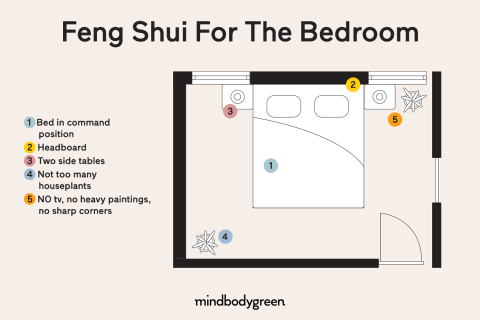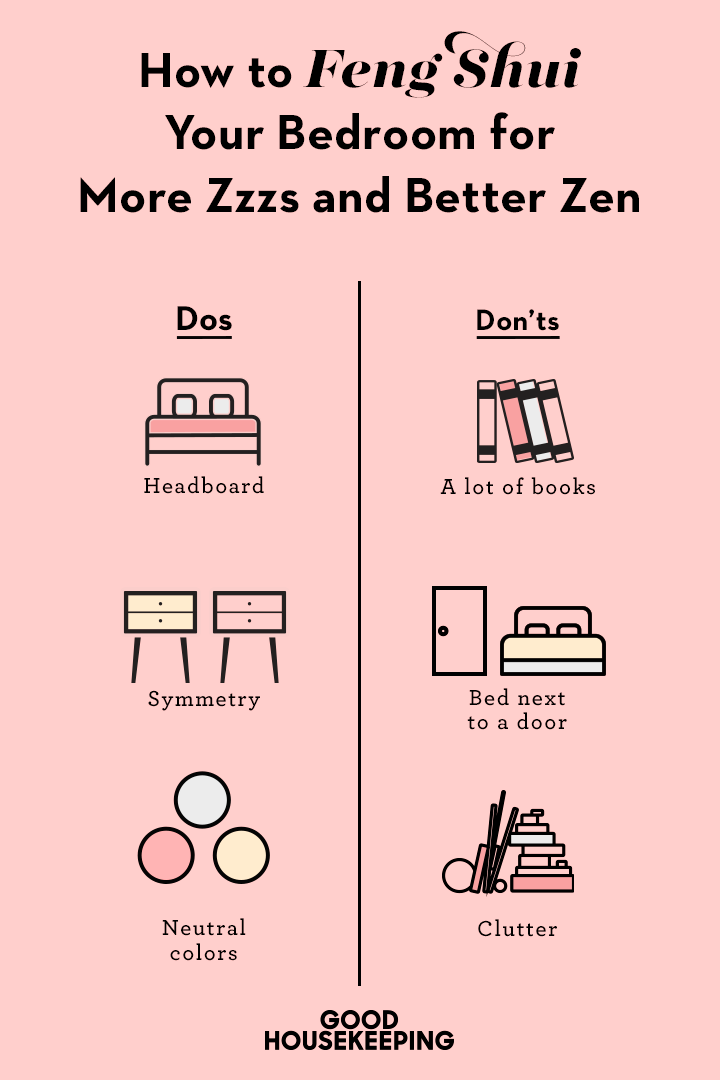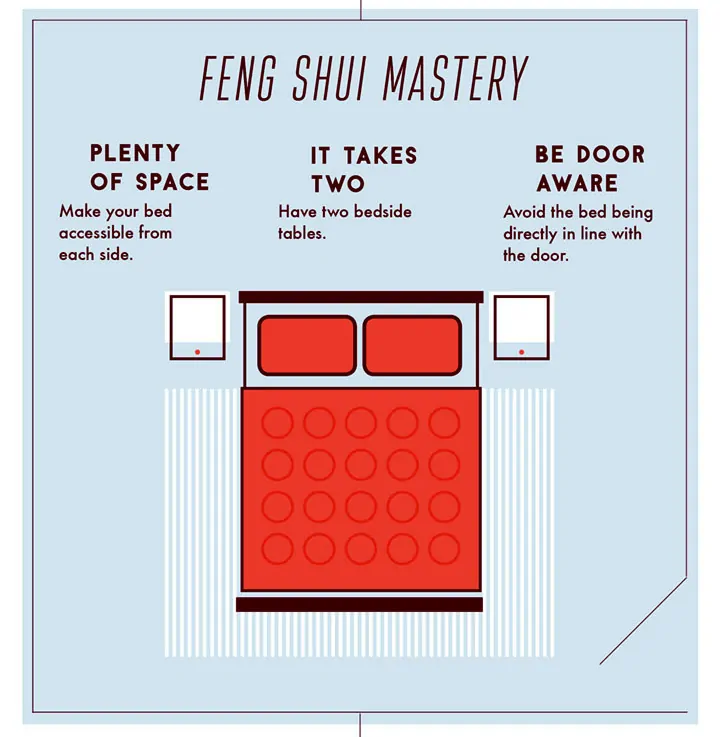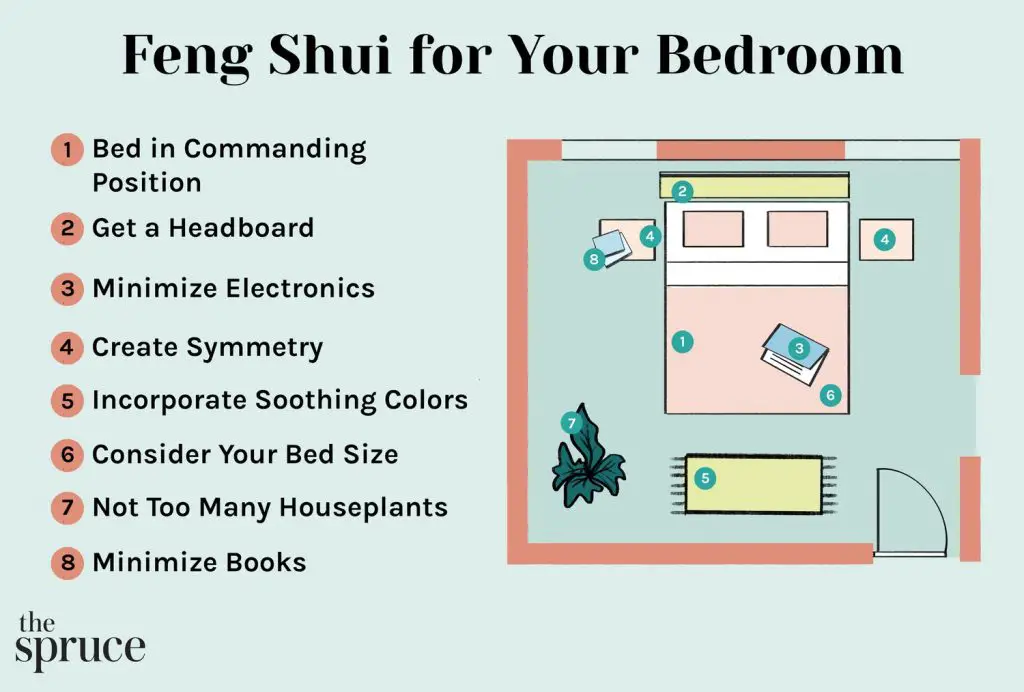A bedroom is more than just a place to sleep. It’s your personal retreat, where rest and harmony should thrive.
Feng Shui, an ancient Chinese practice, provides guidelines to create a space that promotes balance and positive energy. Applying Feng Shui principles to your bedroom can improve your well-being and create a peaceful atmosphere. In this post, we’ll explore essential Feng Shui bedroom rules to help you design a space that feels calm and inviting.
From furniture placement to small decor adjustments, these tips can transform your bedroom into a serene sanctuary. Whether you’re new to Feng Shui or looking to refresh your space, understanding these rules can bring clarity and comfort into your life. Let’s dive into creating a more balanced bedroom!
Related Article: Feng Shui Living Room Rules: Transform Your Space Today
Feng Shui Basics For The Bedroom
Create a calm and balanced bedroom by following Feng Shui rules. Position the bed centrally with a solid headboard. Avoid mirrors facing the bed and keep clutter minimal for better energy flow.
### Feng Shui Basics for the Bedroom
The bedroom is more than just a place to sleep. It’s where you recharge, relax, and reset after a long day. Feng Shui principles can help you create a space that feels balanced, inviting, and full of positive energy.
If your bedroom feels chaotic or uncomfortable, it might be time to rethink its energy flow. Let’s dive into the essential Feng Shui basics to bring peace and harmony into your personal sanctuary.
Importance Of Energy Flow
Energy, or “Chi,” flows through your bedroom and affects your well-being. Blocked or stagnant energy can leave you feeling restless or drained. Imagine waking up refreshed every day—your bedroom’s energy flow plays a big role in this.
Think about your furniture placement. Is your bed squeezed into a tight corner, or is it open to the room? A poorly positioned bed can disrupt energy flow and even impact your sleep quality.
Keep the space clear and uncluttered. Items like laundry piles, unused furniture, or even under-bed storage can block the natural flow of energy. A tidy space allows positive energy to circulate freely, creating a calmer environment.
Key Principles To Apply
1. Bed Placement Matters
Position your bed where you can see the door without being directly in line with it. This is called the “commanding position” in Feng Shui. It helps you feel safe and in control while you sleep.
Avoid placing your bed under windows or beams. These features can create unsettling energy that disrupts rest. If you can’t move your bed, use a solid headboard to create a sense of stability.
2. Declutter for Balance
Keep nightstands simple and balanced. If you have one on one side of the bed, add another on the opposite side. Symmetry promotes harmony in your relationship and within the room.
Remove electronics and work-related items like laptops or paperwork. These objects bring stress and disrupt the relaxing vibe your bedroom needs.
3. Choose Soothing Colors
Opt for colors like soft blues, greens, or neutral tones. These shades promote calm and relaxation. Bright reds or overly dark colors can be too energizing or heavy for a restful space.
Add small accents for personality, but avoid overwhelming the room. A few cushions, artwork, or plants are enough to keep the energy soothing and balanced.
4. Lighting Is Key
Use multiple light sources instead of a single overhead light. Layered lighting allows you to adjust the mood. A dimmer switch or bedside lamps can create a soft, cozy atmosphere.
During the day, let natural light in. Open your curtains to invite fresh energy and brighten the room.
—
What small change can you make today to improve your bedroom’s energy flow? Start simple—a new bed placement, a decluttered nightstand, or a fresh coat of calming paint can make a huge difference.

Credit: www.mindbodygreen.com
Related Article: Feng Shui Tips for Beginners: Create Harmonious Spaces
Bed Placement Tips
Feng Shui emphasizes the importance of bed placement for good energy flow. A well-placed bed can improve sleep, relationships, and overall harmony. Small adjustments can make a big difference in creating a restful space.
Commanding Position Setup
Place your bed in the commanding position to invite positive energy. This means the bed should face the door but not be directly in line with it. You should be able to see the door while lying in bed. This setup creates a sense of security and control. Avoid placing the bed directly under a window, as it can disrupt restful sleep. A solid wall behind the bed offers support and stability.
Avoiding Direct Door Alignment
Never position the bed directly in line with the door. This is known as the “coffin position” in Feng Shui and symbolizes loss of energy. If this placement is unavoidable, use a room divider or curtain to block the line of sight. Alternatively, a footboard or a sturdy bench at the end of the bed can create a barrier. These solutions help maintain energy flow without disrupting the room’s balance.
Color Choices For Harmony
Did you know the colors in your bedroom can impact your mood and energy? Feng Shui emphasizes the importance of choosing the right shades to create balance. By being mindful of your color choices, you can foster relaxation and harmony in your space.
Calming Hues For Relaxation
Soft, neutral tones like beige, cream, and light gray are perfect for a peaceful atmosphere. These shades create a soothing environment that helps you unwind after a long day. Pair them with pastel blues or greens for an added touch of tranquility.
Earthy colors like light brown or muted terracotta can also make your bedroom feel grounded and stable. Imagine stepping into a room where the walls seem to embrace you with warmth and calm. Wouldn’t that be comforting?
You can even experiment with gentle lavender or blush pink accents. These colors add a subtle sense of serenity while still feeling elegant. Try adding them through throw pillows, curtains, or a cozy blanket.
Avoiding Overstimulating Colors
Bright reds, oranges, or neon shades can be too stimulating for a bedroom. These colors are high-energy and can disrupt your ability to relax or fall asleep. While they’re great for active spaces, they can overwhelm a sleeping area.
Bold patterns with clashing colors can also create visual chaos. Instead, aim for simple designs that complement your calming palette. Ask yourself: does this make me feel at peace, or does it feel too busy?
If you love vibrant colors, try using them sparingly as accents. A small pop of red in artwork or a decorative item can add personality without overwhelming the room. Balance is key to creating harmony.
What colors in your bedroom make you feel calm and rested? Take a moment to evaluate your current setup. A small change in your color scheme might bring you closer to the harmonious space you’ve been dreaming of.

Credit: www.goodhousekeeping.com
Related Article: Basic Rules of Feng Shui: Unlock Harmony at Home
Decluttering For Positive Energy
Creating a serene and balanced bedroom begins with decluttering. A clutter-free space allows positive energy, or chi, to flow freely. In Feng Shui, removing unnecessary items and organizing for balance are essential practices. These steps can make your bedroom more peaceful and inviting.
Removing Unnecessary Items
Start by eliminating items that no longer serve a purpose. Unused objects, broken items, or worn-out furniture block positive energy. Keep only items that make you feel calm and happy. Avoid storing things under your bed, as this disrupts energy flow. A clear and open space supports relaxation and better sleep.
Organizing For Balance
Arrange your belongings to create harmony in the room. Balance furniture placement to ensure smooth energy circulation. Use storage solutions like baskets or shelves to keep surfaces tidy. Avoid overcrowding your nightstand or dresser. A balanced layout promotes peace and relaxation.
Pay attention to symmetry when organizing. Place matching lamps or decor items on each side of the bed. Symmetry enhances stability and encourages positive relationships. A well-organized space nurtures both your mind and body.
Lighting And Atmosphere
Creating the perfect lighting and atmosphere in your bedroom is a key aspect of Feng Shui. The way you light your space can directly affect your mood, energy levels, and even the quality of your sleep. Let’s explore how natural light and soft lighting can help you achieve a harmonious and peaceful bedroom environment.
Natural Light Benefits
Natural light is one of the easiest ways to bring positive energy into your bedroom. Sunlight not only brightens your space but also uplifts your mood and promotes a healthier sleep cycle. Position your bed and furniture to make the most of the daylight streaming into your room.
Think about your curtains. Heavy, dark drapes might block too much light, making your room feel gloomy during the day. Opt for lighter fabrics that allow sunlight to filter in softly, creating a warm and inviting atmosphere.
If your bedroom lacks natural light, you can use mirrors to reflect and amplify what little light you do have. Hang a mirror opposite your window, but avoid placing it where it reflects your bed—Feng Shui experts believe this can disrupt your energy flow.
Soft Lighting For Serenity
As the sun sets, soft lighting is your best friend for creating a calm and peaceful environment. Bright, harsh lights can feel jarring, especially when you’re winding down for the night. Use warm, dimmable lights to set the tone for relaxation.
Table lamps or wall sconces are perfect for bedtime reading or creating a cozy glow. Avoid overhead lights as your main source in the evening—they can feel too intense. Instead, layer your lighting with multiple sources to create depth and softness.
Consider using smart bulbs or timers to adjust your lighting automatically. This can help you stick to a routine and signal to your body that it’s time to relax. What lighting choices have you made in your bedroom? Are they helping you feel calm or keeping you awake? Small changes can make a big difference in how your space feels.
Decor Essentials For Balance
Creating a harmonious bedroom is about more than choosing pretty furniture. Balance is key, and Feng Shui offers practical rules to help you achieve it. From artwork to natural elements, every detail matters when designing a space that feels calm and inviting.
Choosing Artwork Wisely
The art you choose for your bedroom isn’t just decoration—it sets the tone for your space. Avoid images that evoke sadness, chaos, or loneliness. Instead, opt for uplifting or serene visuals like landscapes, abstract designs, or happy moments.
Place artwork thoughtfully. Hang it at eye level so it’s easy to enjoy without straining your neck. Avoid hanging heavy frames directly above the bed—it can create a feeling of unease. Would you sleep soundly knowing something heavy is looming above you?
Think about colors too. Soft, warm tones bring relaxation, while bold or overly bright colors may energize you in ways that disrupt sleep. A well-chosen piece of art can subtly guide the mood of your room.
Incorporating Natural Elements
Natural elements bring life and balance to your bedroom. Adding plants is a simple way to freshen up the air and boost your mood. Choose greenery like snake plants or peace lilies, which thrive indoors and are easy to care for.
Wooden furniture or décor adds warmth and stability to your space. If you can’t afford new furniture, small touches like wooden picture frames or a bamboo vase can make a difference. Natural textures like cotton or linen for your bedding also enhance comfort.
Be mindful of placement. Keep plants away from your bed to avoid feeling crowded. And balance natural items with neutral tones to avoid overwhelming the room. Does your bedroom feel balanced or cluttered?
Using these tips, you can transform your bedroom into a space that feels calm, balanced, and welcoming. Small changes can make a big difference in your daily life.
Enhancing Air Quality
Creating a harmonious Feng Shui bedroom isn’t just about furniture placement or color schemes. The quality of air in your room plays a huge role in how restful your sleep will be. Clean, fresh air promotes better energy flow and supports your health, making it a priority for a truly balanced space.
Using Air-purifying Plants
Adding air-purifying plants to your bedroom is one of the easiest ways to boost air quality. Plants like snake plants, peace lilies, and spider plants not only look great but also help remove toxins from the air. They release oxygen and improve humidity levels, which can be especially helpful if you live in a dry environment.
Place a small plant on your nightstand or a larger one in a corner to keep the energy light and fresh. Make sure the plant gets enough indirect sunlight to thrive. But don’t overcrowd the room—too many plants can disrupt the flow of energy and might even make the air feel heavy.
Avoiding Artificial Fragrances
Artificial fragrances might seem like a quick fix to make your room smell nice, but they often contain chemicals that can lower air quality. Those sprays, plug-ins, and scented candles may release harmful pollutants into your space, which can irritate your lungs and disturb your sleep.
Instead, opt for natural alternatives like essential oil diffusers with calming scents such as lavender or eucalyptus. You could also simmer some cinnamon sticks and orange peels on the stove for a cozy, chemical-free aroma. Keep in mind that subtle scents are best—overpowering smells can disrupt the peaceful energy you’re trying to create.
Have you ever noticed how you feel more refreshed when you wake up in a room with clean, fresh air? Paying attention to these small details can transform the way you rest. What steps will you take today to enhance the air quality in your bedroom?
Creating A Restful Sleep Environment
Arranging your bedroom with Feng Shui principles can improve restful sleep. Place the bed away from doors and windows for calm energy. Choose soft colors and avoid clutter to create a peaceful atmosphere.
Creating a restful sleep environment is at the heart of Feng Shui principles for the bedroom. Your bedroom should feel like a sanctuary—calm, inviting, and free from distractions. A well-designed space promotes better sleep and a more relaxed state of mind.
###
Limiting Electronics In The Room
Electronics can be a major disruptor in your bedroom. Devices like TVs, laptops, and smartphones emit blue light that interferes with your body’s natural sleep rhythms. They also carry the energy of work, entertainment, or stress into a space meant for rest.
Consider removing all screens from your bedroom. If you use your phone as an alarm clock, switch to a simple analog clock instead. Keep chargers and other gadgets in a different room to create a clean, tech-free zone.
Can’t avoid electronics completely? Unplug them before bed and cover them to reduce their energetic impact. Even small changes like this can make your space feel more serene.
###
Choosing Optimal Bedding
Your bed is the centerpiece of your sleep environment, so the right bedding matters. Soft, breathable materials like cotton or linen help regulate your body temperature throughout the night. Neutral or earthy colors promote a sense of calm and balance.
Think about the weight and feel of your blankets. Too heavy, and you might feel trapped; too light, and you may struggle to stay warm. Choose bedding that feels just right for your preferences and the season.
Don’t forget about the mattress and pillows. A worn-out mattress can disrupt your sleep and energy flow. Invest in high-quality options that support your body comfortably. Flip and air out your mattress regularly to keep it fresh and aligned with Feng Shui principles.

Credit: www.dreams.co.uk
Conclusion
A Feng Shui bedroom creates balance, peace, and better energy flow. Small changes, like furniture placement or choosing calming colors, make a difference. Keep your space clutter-free to invite positive vibes. Let natural light and fresh air energize the room.
A well-arranged bedroom promotes restful sleep and a healthier mind. Start with simple adjustments and notice the impact on your daily life. Your bedroom should feel like a sanctuary, full of harmony and relaxation. Apply these Feng Shui tips today for a more peaceful living space.
Related Article: Psychology of Decorative Art: Unlocking Emotional Impact
- Basic Rules of Feng Shui: Unlock Harmony at Home - May 7, 2025
- Feng Shui Living Room Rules: Transform Your Space Today - May 6, 2025
- Feng Shui Tips for Beginners: Create Harmonious Spaces - May 4, 2025



